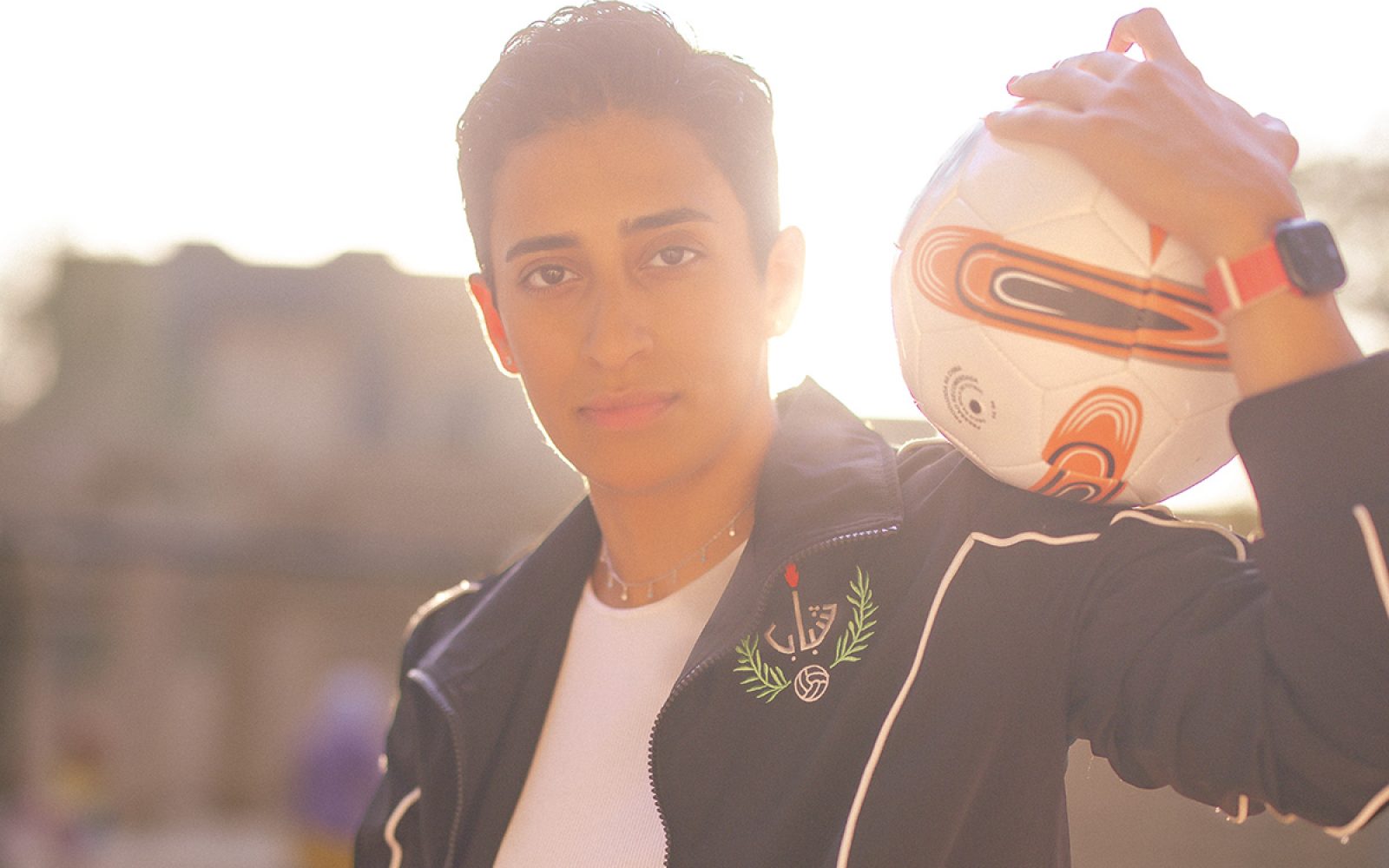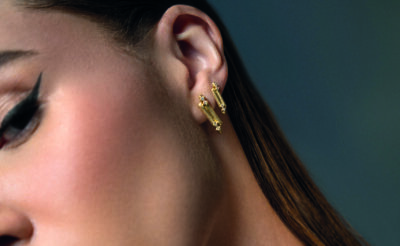Only five years since being allowed to enter stadiums as spectators, Saudi women have made astonishing leaps in the world of sports. The upcoming Riyadh 2034 Asian Games, and Saudi Arabia’s bid to host the FIFA World Cup in the same year, are fostering an inclusive and supportive environment for the Kingdom’s sportswomen. Ambitious, fierce and committed, Saudi’s female athletes aren’t looking for validation — they’re going for gold.
Sara Khalid
Goalkeeper for the Saudi national women’s football team
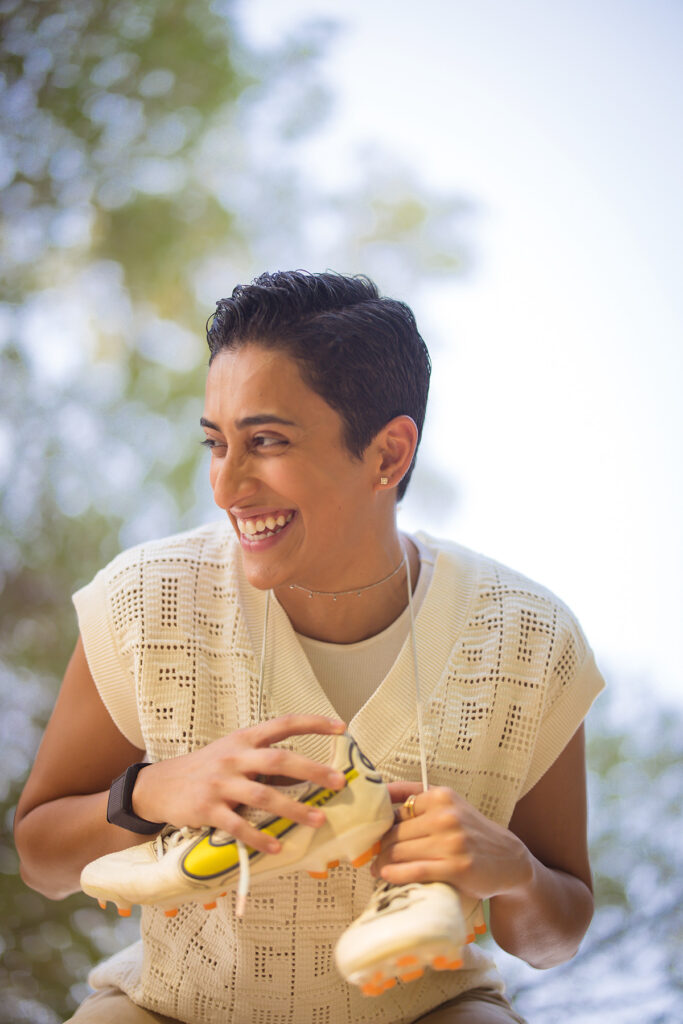
Photographed by Tasneem Al Sultan, styled by Suliman Mohammad Al Omair
It’s not an exaggeration to say football is the number one sport in Saudi Arabia — the goalkeeper for the Saudi women’s football team says it’s actually a national obsession. Her own passion for the sport comes from a very emotional place. “I used to accompany my father, who passed away in 2007, to Al Ettifaq club where he used to work. From attending games to meeting players, he was the main reason behind my love for this sport. It was our way of bonding,” she says. “Back then, we didn’t have academies or clubs for young girls, so I played in our little garden at home with my nephew and niece. In college, I switched to playing basketball since it was the only option back then. Then I joined a local club whose coach asked me whether I wanted to tryout for the goalkeeper position and I agreed. I’ve been a goalkeeper since that day,” she adds.
Sara Khalid went on to captain the national women’s football team, leading it to a stunning victory in its first ever international match, against Seychelles. Entering FIFA’s women’s world ranking for the first time earlier this year is another achievement for the team. She’s also the goalkeeper of the women’s team at the elite Saudi football club Al Nassr, whose men’s team is currently home to Cristiano Ronaldo. Launching into the limelight can be daunting for some, but Sara’s holding her own amid the expectations that come with playing at an international level, even rubbing shoulders with the world’s best players, both on the field and off. “Pressure is my best friend. Over time, I’ve managed to handle pressure and actually perform well with it. It’s part of the game and I always talk myself into eliminating unnecessary expectations that I may have put on myself or receive from the people around me. This helps me play freely without being afraid to make mistakes. I’m learning how to use it for my own benefit to fuel me during competitions,” she says.
Playing a sport is a test of both mental prowess and physical strength. Sara has her own ways to stay motivated and focused during setbacks and tough matches. “I always try to focus on the main goal which is to grow at my own pace, so whenever I experience a setback, it is normal to feel a bit of frustration, but I make sure to move on quickly and focus on the next step. I also seek advice from a sports mental coach to guide me through my journey and how to deal with different situations as a professional player.”
Support from the government, professional physiotherapists, mental health coaches, family and fans is helping to repeat this success story for sportswomen all over the country. “The only obstacle I’ve faced was not being able to find a women’s team back when I was younger. These days, the support is tremendous and everything we once wished for is becoming a reality at the highest standards,” she says. “We can see the impact of this encouragement when so many young girls sign up at football academies and regional training centres. The number of Saudi female players and women’s teams is increasing every single day. By empowering women, we are actually empowering the whole of society.”
Sara believes her contribution to the sport and to her country goes beyond that of playing for the national team. The scope is much wider today and the leading ladies in sport hope to move forward responsibly. “I want to pave the way for the younger generations to pursue their passion, grow their talent, and live their full potential. I also want to change the misconception around women’s growth and progress in Saudi Arabia by representing my country on an international level,” she says. “We are currently living through a radical transformation in all aspects and fields, and the numbers speak for themselves. I believe with time things will improve rapidly so our dreams and ambitions as women and as sportspersons should match these big changes,” she says. Ambitious and focused, Sara Khalid’s game plan is one to watch.
Dana Albuainain
Captain of the Saudi women’s volleyball team
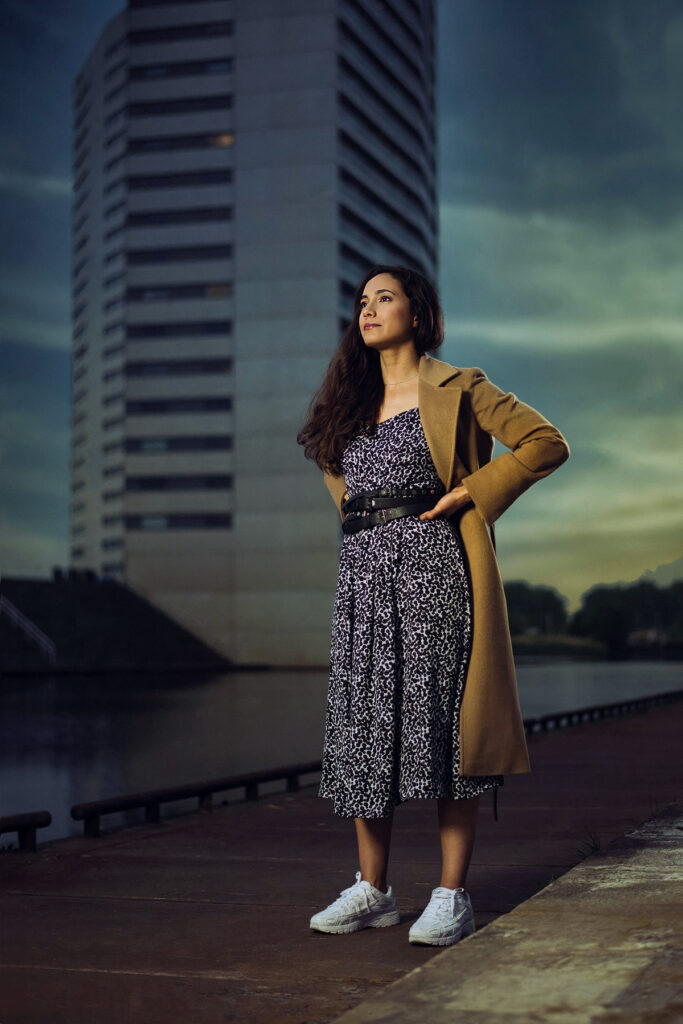
Photographed by Gedion van Eiken
A sudden pivot from medical school and a new found love for sports in a foreign land led to Dana Albuainain playing volleyball in her home country, as captain of the national women’s team. Her journey may have been serendipitous but she’s steadfast in the belief that she has found her true calling. “I first played volleyball at the age of 20, in the student club Veracles in the city of Groningen in the Netherlands. For my studies, I was required to learn Dutch and I wanted to join a team sport where I could immerse myself in the language and culture outside of an academic setting. As it turned out, I fell in love with volleyball! It became an outlet for stress and a source of motivation for me during medical school,” she says.
With her family’s support and encouragement from the Saudi authorities, Dana embarked upon an unstoppable journey. Some of her achievements include winning the MVP award in Saudi Arabia’s first women’s championship in Riyadh in 2021. She was also chosen to represent Saudi’s first women’s national team in 2022. She won a silver medal for Al-Ettifaq club in the Saudi games in 2022 and competed in the West Asian Games in Jordan, in the team’s first international appearance.
As captain, she feels responsible for boosting the morale of the players and fostering team spirit. She leads by example by aiming to be a team player herself, not only for her volleyball team but also for all sportswomen in Saudi Arabia. “To me, my personal success represents the success of all women in sports. In the future I would like to pursue my education in certain aspects of the sports field in order to coach, educate and be involved in harnessing the potential of future athletes and contribute to their growth. I aim to become a member of the policy makers and leaders in female sports in Saudi Arabia,” she says.
Her optimism is infectious and her genuine love for sport is apparent in everything she does and hopes to achieve. She also emphasises the impact of Saudi women’s sports teams in breaking societal stereotypes. “In the beginning, the acceptance was not widespread, but with perseverance of Saudi teams and the leadership’s efforts in the inclusion of women in sports, more people are normalising women’s participation, and this is thankfully gaining more support from the public.” “I aspire to be the best female volleyball player in Saudi Arabia in my generation, hoping to be an inspiration to the future generations. By contributing to changing perspectives about gender bias in sports, I hope to make a real impact. I want to prove that that females can do it too, maybe even better!” she says.
Mashael Ibrahim Al Hazmi
Road cyclist for Saudi Arabia
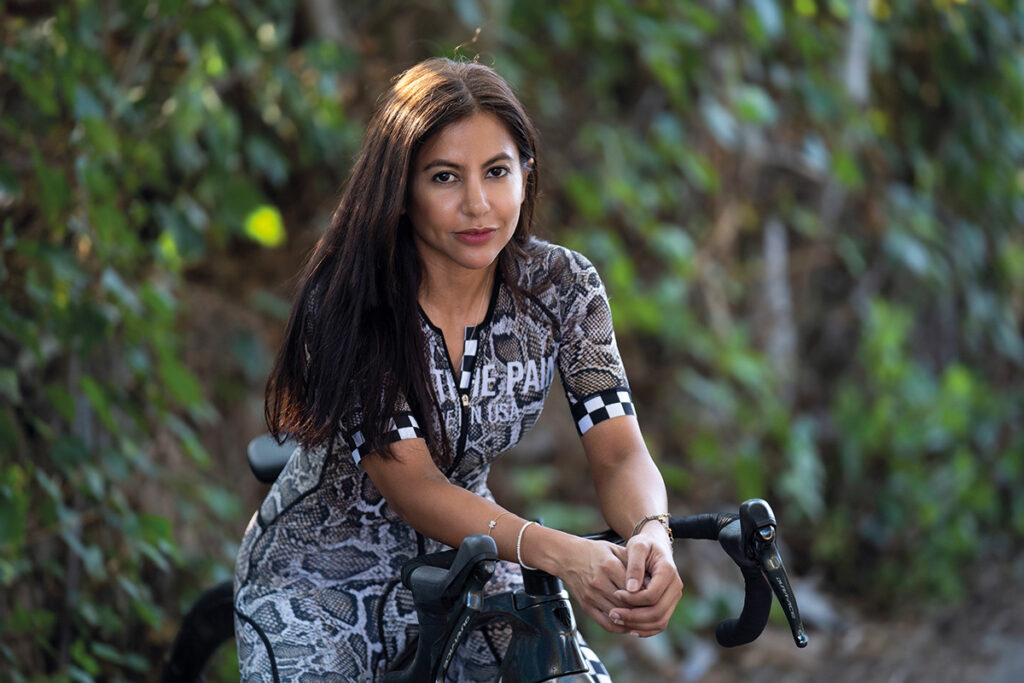
Photographed by Nouf Ibrahim
A regular job by day and gold medallist by night, road cyclist Mashael Al Hazmi delivers a stellar balancing act. “I’ve always loved playing sports but started cycling just three years ago, that too by accident. In 2020, just before the pandemic lockdown, I had injured my ankle with a small fracture. I was keen to play sports again after 10 months of physical rehabilitation, so the doctors gave me two choices— either cycling or swimming. I chose cycling and that’s where it all started,” she says. Not only did she enjoy the sport, but she also started competing in (and winning) road cycling tournaments across the country, as an amateur. Within two years and with a spate of achievements under her belt, she brought home the gold medal at the Saudi Games in 2022. “I also secured three individual bronze medals at the Arab Track Championship for the 500-meter time trial race, the sprint race and the Omnium race in Cairo last year,” she says.
Medal count aside, as a proud citizen and sportswoman, Mashael aims to contribute more significantly to her country. “I want to work with the continental team or professional development team for few years and then later translate this experience for other cyclists as a coach or sports director. That would be my ultimate goal,” she says. Her journey as a road cyclist hasn’t been easy, with a day job as a budgeting specialist competing for attention. This hardly deters the champion as she puts her passion before all else. “Cycling is, without a doubt, an extremely tough sport. You spend months for even a little bit of improvement in your performance, but I’m going to stay committed and focused. I look forward to many incredible things coming my way in the near future,” she says.
She draws inspiration from global cycling champions, both male and female, training her eyes on the international circuit. “They give me an idea of what top level races should look like and this motivates me to do my best. Following the world’s best cyclists steers me towards bigger goals and reassures me about a future for women in this sport,” she says. Her message to aspiring Saudi sportswomen rests heavily on persistence, self-confidence and commitment. “It’s also important to be mentally strong because that will translate into your performance in any sport. It’s about endurance and balance in every way,” she adds. “There are tremendous opportunities in sports now and all fields are wide open! This is our turn to shine and to improve our game as Saudi sportswomen.”
Mariam Saleh BinLaden
Saudi endurance swimmer
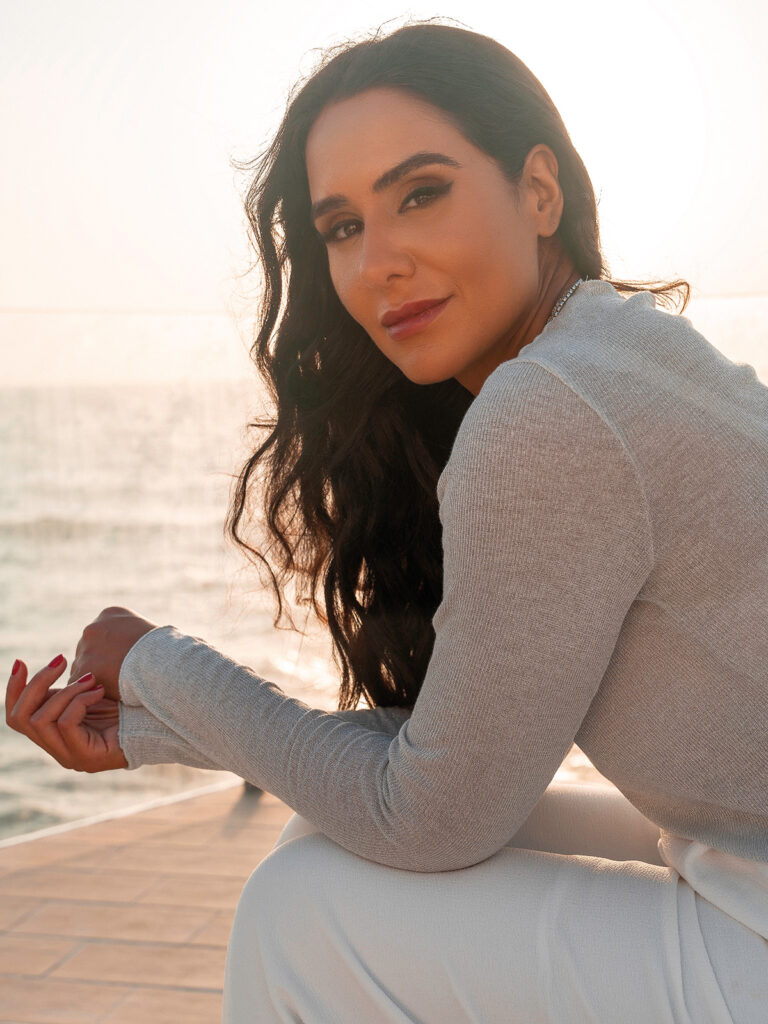
Photographed by Mbarak Madhi, styled by Dalal Madhi, makeup by Reem Refaei, hair by Imad Mehrez
‘Fierce’ is the one word that immediately comes to mind in the company of record-breaking endurance swimmer and philanthropist Mariam Saleh Binladen. After all, it’s not every day one comes across someone who not only shrugs off her critics with élan but also routinely dodges sharks in the deep sea. If that’s not edgy, what is? “I’m very positive and surround myself with like-minded people so maybe there’ve been critics along the way, but once I make up my mind and set my goals, nothing can deter me. My family has been and remains my greatest supporter,” she says.
Having broken numerous records as the first Arab woman to swim from Saudi Arabia to Egypt across the Red Sea, the first woman to swim the 162km-long River Thames and the first Arab woman to complete the 4.5km Hellespont Swim in Turkey, from Europe to Asia, she takes immense pride in her life’s work. “No amount of training could have truly prepared me for the Red Sea swim. The conditions were dangerous in terms of tides, busy shipping lanes and, as you know, it’s a breeding ground for sharks. On the other hand, the challenge during the swim from Europe to Asia was that I had to avoid the reverse current. This is a feat in itself when there are 2,000 other swimmers, and you need to keep checking for landmarks. If you hit a reverse current, you end up in a cove or returning to the starting point, not at the finish line!” says Mariam. “I also hold the record for being the first woman to swim the Dubai Canal, which was my first swim in the Middle East, in 2017. The swim started in the dark and finished at the break of dawn with the beautiful Dubai skyline in front of me,” she adds.
A chance meeting with fellow endurance swimmer Lewis Pugh led to her interest in the biodiverse coral reefs in the Red Sea between her home in Jeddah and Egypt. The motivation for the swim was to spotlight the erosion of the coral reefs due to climate change during the COP27 in Sharm El Sheikh, Egypt.
A dentist by profession, Mariam is also an advocate for Syrian refugees. “My initial goal was to raise awareness of the plight and tragic circumstances of Syrian refugees. I then refocused my efforts and worked collaboratively with UNHCR to establish a not-for-profit dental clinic in the Alazrag refugee camp in Jordan. It goes without saying that these causes motivate me personally and professionally. I want to raise and maintain awareness of the plight of child refugees,” she says.
As a Saudi sportsperson, she feels immensely supported and encouraged by the sports community and country at large. “There are no barriers to women participating in swimming or other sports in Saudi and, in fact, women’s participation in sport is encouraged,” she says. “As an aspiring swimmer, you need to be brave, committed and prepared to practice for several hours a day. This means both swimming and workouts such as Pilates and body conditioning. In terms of mental preparation, you really need to be goal-oriented and disciplined to make it as a swimmer,” she adds. She handles the pressures and expectations that come with the sport with a practiced composure, emphasizing the importance of self-belief, resilience and unconditional support from her family. She’s also always prepared with a safety net, just in case. “I always have a clear but flexible back-up plan. Conditions can change by the minute in the open water so it’s important to have a well-rehearsed plan B ready and be surrounded by those you can depend on,” she says. With this independent and fierce spirit, Mariam prepares for her next goal. An inspiration to swimmers across the world, she leaps into the future determinedly, in her own lane.
Read Next: 8 Inspirational Emirati Women On Empowerment, Unity And Inspiring The Next Generation
- Words by Priyanka Pradhan

